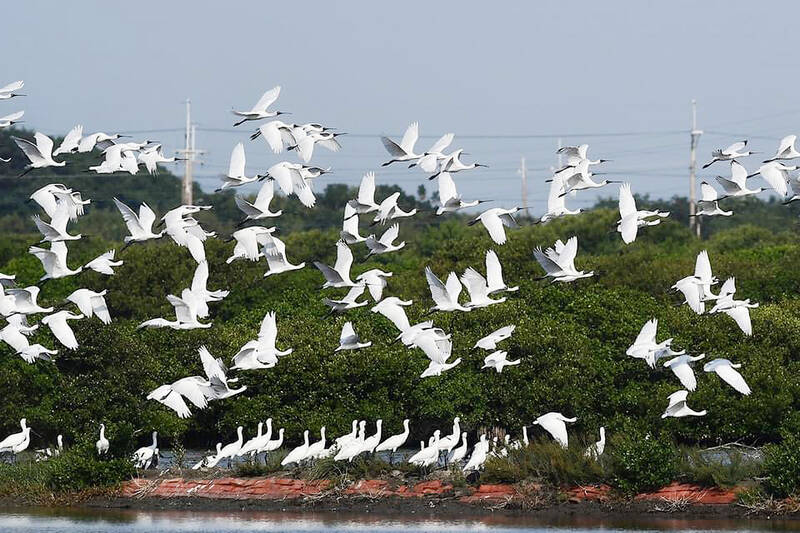The Ministry of Agriculture’s Taiwan Biodiversity Research Institute signed a memorandum of understanding (MOU) with Taiwan Cooperative Bank (TCB) to collaborate on the first botulism early warning system for black-faced spoonbills in Taiwan.
The institute introduced botulinum antitoxin therapy after 73 black-faced spoonbills died of botulism in Tainan’s Cigu District (七股) about 23 years ago.
Black-faced spoonbills are endangered and about 60 percent of the bird species’ global population spend the winter in Taiwan, making it one of the most proportionally impactful conservation efforts in Taiwan, the institute said.

Photo courtesy of Tainan City Ecological Conservation Association
However, incidents of botulism in black-faced spoonbills remained frequent in recent years and has undermined both the wetland ecosystems and the national image, it said.
The MOU, signed on Tuesday, would enhance the effort by establishing a black-faced spoonbill rescue chain that combines rescue, medical care and early warning, with satellite data collected and analyzed to anticipate sites with high botulism risks, the institute said.
The institute has long monitored black-faced spoonbill populations, and rescued sick and injured birds, while TCB has been promoting wetland conservation by funding the Taiwan Black-faced Spoonbill Conservation Association’s project to livestream black-faced spoonbills’ habitat in Dingshan Village (頂山), it said.
The collaboration between the institute and TCB is aimed to set up the first botulism early warning system for black-faced spoonbills in Taiwan, marking a shift from passive rescues to active prevention in wild bird conservation, it added.
Botulism in black-faced spoonbills mostly occurs in coastal wetlands in southwestern Taiwan during dry winters, veterinarian Chan Fang-tse (詹芳澤) said.
Black-faced spoonbills could get poisoned indirectly if they eat the toxic bacteria in fish, shrimp or shellfish, which would disrupt their motor nerve conduction and impair their ability to fly, he said.
Data from an annual survey led by the Hong Kong Bird Watching Society showed a total of 7,081 sightings of black-faced spoonbills were documented globally from Jan. 18 last year to Jan. 19.
Of all the sightings, 4,169 were documented in Taiwan, up 34 from last year, accounting for 58.9 percent globally.
That means Taiwan remained as the most winter stopover site for black-faced spoonbills, while 1,671 black-faced spoonbills were recorded in China, 716 in Japan and 328 in Hong Kong and Shenzhen.
In other news, the ministry’s Animal and Plant Health Inspection Agency on Thursday said migratory birds arriving in Taiwan have peaked, warning poultry farmers to strengthen bird flu prevention.
Highly contagious avian influenza in poultry and wild birds has increased across Europe, the US, Japan and South Korea this year — Taiwan is situated downstream along wintering birds’ migration routes and must be aware of such viruses from abroad, it said.
Additional reporting by CNA

Taiwanese can file complaints with the Tourism Administration to report travel agencies if their activities caused termination of a person’s citizenship, Mainland Affairs Council Minister Chiu Chui-cheng (邱垂正) said yesterday, after a podcaster highlighted a case in which a person’s citizenship was canceled for receiving a single-use Chinese passport to enter Russia. The council is aware of incidents in which people who signed up through Chinese travel agencies for tours of Russia were told they could obtain Russian visas and fast-track border clearance, Chiu told reporters on the sidelines of an event in Taipei. However, the travel agencies actually applied

Japanese footwear brand Onitsuka Tiger today issued a public apology and said it has suspended an employee amid allegations that the staff member discriminated against a Vietnamese customer at its Taipei 101 store. Posting on the social media platform Threads yesterday, a user said that an employee at the store said that “those shoes are very expensive” when her friend, who is a migrant worker from Vietnam, asked for assistance. The employee then ignored her until she asked again, to which she replied: "We don't have a size 37." The post had amassed nearly 26,000 likes and 916 comments as of this

New measures aimed at making Taiwan more attractive to foreign professionals came into effect this month, the National Development Council said yesterday. Among the changes, international students at Taiwanese universities would be able to work in Taiwan without a work permit in the two years after they graduate, explainer materials provided by the council said. In addition, foreign nationals who graduated from one of the world’s top 200 universities within the past five years can also apply for a two-year open work permit. Previously, those graduates would have needed to apply for a work permit using point-based criteria or have a Taiwanese company

The Shilin District Prosecutors’ Office yesterday indicted two Taiwanese and issued a wanted notice for Pete Liu (劉作虎), founder of Shenzhen-based smartphone manufacturer OnePlus Technology Co (萬普拉斯科技), for allegedly contravening the Act Governing Relations Between the People of the Taiwan Area and the Mainland Area (臺灣地區與大陸地區人民關係條例) by poaching 70 engineers in Taiwan. Liu allegedly traveled to Taiwan at the end of 2014 and met with a Taiwanese man surnamed Lin (林) to discuss establishing a mobile software research and development (R&D) team in Taiwan, prosecutors said. Without approval from the government, Lin, following Liu’s instructions, recruited more than 70 software